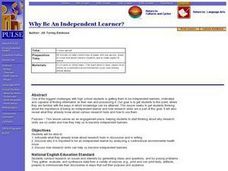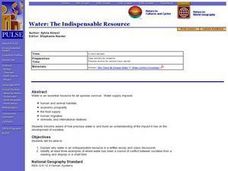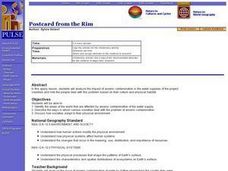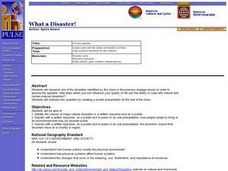Curated OER
What Kind of Reader Are You?
Students write a personal reading history about how reading has influenced their lives. They identify their strengths, weaknesses, and preferences as readers through a survey. Students examine what goes on in their minds while they read...
Curated OER
Groundwater Modeling
Students evaluate the effects of point and non-pointy sources of water pollution using a model. They assess human impact on water quality. Students build a model which represents an aspect of the hydrosphere and compare their model with...
Curated OER
The Earth is an Orange
Students examine and identify the various types of maps. Using two types of maps, they compare the data that can be gathered from each one. They also identify and locate the continents and the oceans. They review the purposes of each...
Curated OER
Planet Earth
Students explore and analyze data from different maps in order to explain geographic diversity among the continents. Student groups research continents' physical features and examine how they contribute to quality of life for inhabitants.
Curated OER
What is a Successful Reader?
Learners identify and discuss characteristics of "successful reader," describe what goes on in their minds while they read various texts, and explain through presentation techniques that readers use to comprehend text.
Curated OER
May We Present Planet Earth?
Students draw a map to scale. They illustrate knowledge of how to use DOGS TAILS on a map. Students identify the main parts of a map. They identify and illustrate the major features necessary for sustaining a quality of life for a society.
Curated OER
A Town in Trouble
Pupils identify and describe the parameters and analytical techniques used to characterize water contamination in a class presentation. They identify the consequences of high contamination levels in the water supply during a class...
Curated OER
Why Be An Independent Learner?
Students discuss why research skills are important to have as a skill in life. As a class, they identify their prior knowledge when it comes to researching a topic and discuss why it is important to be an independent learner. In...
Curated OER
Language Arts: Investigating Issues That Matter
Students are able to become more informed about the dangers of water contamination by sharing their prior knowledge with each other. They discover the importance of communicating these dangers to the public.
Curated OER
Math Lesson: How Many People Live There?
Students are able to calculate the population density of a country, and calculate the population density of large cities in that country. They are able to create an appropriate graph to represent their data for that country.
Curated OER
Science: Headline
Students are able to identify questions they need to answer to comprehend a specific news article. They are pushed to question how they know that their drinking water is safe.
Curated OER
Science: 4 X 4
Students generate four statements and four questions based on their current level of understanding of the article from the engage lesson. They
evaluate the statements and questions that they have generated and those of their classmates...
Curated OER
World Geography: Water: The Indispensable Resource
Students are able to explain why water is an indispensable resource in a written essay and class discussion. They identify at least three examples of where water has been a source of conflict between societies from a reading and...
Curated OER
Language Arts: How Can Research Shape Ideas?
Students are able to characterize arsenic and determine its potential health threats in writing. They are able to compare and contrast arsenic to other water pollutants using Venn diagrams. Students are able to demonstrate essay skills...
Curated OER
Arsenic Globally
High schoolers, using directed questions, identify five internet resources. They use these resources to identify relevant information by highlighting those sections that address the provided questions. Students present the answers to...
Curated OER
Finding the Mother Lode
Students engage in a paper treasure hunt to find a lode deposit of gold using the placer deposit concentrations of metals found in stream sediments. They use topographic maps and metal concentrations to assist them. Students discuss the...
Curated OER
World Geography: Who am I?
Learners are able to provide a basic description of one country that has arsenic in its water supply. They are able to locate these countries on a map. Students explore the majors countries that have been affected by arsenic...
Curated OER
Science: What Happens to Create the Lode?
High schoolers understand how mineral deposits are formed and why they are not evenly dispersed. They create and describe three different precipitates from four solutions simulating mineral ore deposit formation in sedimentary rock.
Curated OER
World Geography: Postcard from the Rim
Young scholars are able to identify the areas of the world that are affected by arsenic contamination of the water supply. They are able to describe the ways in which various societies deal with the problem of arsenic contamination. ...
Curated OER
What a Disaster!
Pupils identify the causes of major natural disasters in a written response and on a poster. They explain with a written response, on a poster and to peers in an oral presentation, how people adapt to living in an environment that may be...
Curated OER
The Water Dilemma
Students read about and discuss the importance of easily available, clean drinking water. They participate in a role play scenario in which only one drinking fountain in the school has potable water.
Curated OER
Dirty Water: A Case Study
Young scholars identify the causes of arsenic contamination. They list the world organizations involved in ensuring sanitary water supplies. Students describe various methods to mitigate arsenic contamination.
Curated OER
Preparing to Speak
High schoolers articulate what elements must be present in a successful, persuasive speech by composing a "presentation plan." They explain what they know about speech delivery in preparation for the presentation of their final projects.
Curated OER
Water Mitigation
Students identify the major health effects of arsenic contamination. They explain how arsenic gets into groundwater in Bangladesh. Students list ways to prevent arsenic from getting into drinking water. They explain why access to clean...
Other popular searches
- State of Arizona
- Miranda v. Arizona
- Uss Arizona
- Arizona History
- Arizona Geographic Alliance
- U.s.s. Arizona
- Desert Animals in Arizona
- Arizona Legislators
- Arizona Native Americans
- Great Aunt Arizona
- Indigenous People of Arizona
- Miranda v Arizona

























